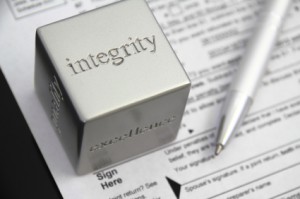David Gebler is a thought leader, speaker and seminar leader on the subject of ethics in business. Trained as a lawyer, David is a Senior Lecturer at Suffolk University where he teaches Business Ethics and sits on the International Advisory Board of the Graduate Program in Ethics and Public Policy; he is also a principal at Skout Group, a firm focused on culture change.
With globally significant public and private sector clients on his resume, David brings a broad perspective to questions of ethics in organizations.
.jpg)
CHG: David, thanks for joining us here. Tell me, why is it so hard for companies to get their heads around thinking about ethics?
DG: While ethics issues are of critical importance to organizations today, “ethics” as a business function is perceived as quite amorphous and hard to define. In many organizations ethics is synonymous with “compliance,” narrowing the focus to ensuring adherence to stated standards of conduct. In other organizations “ethics” is treated as a vague platitude without clarity as to how it drives behavior.
CHG: You told me once there were three approaches to business ethics: behavioral, philosophical, and legal. Can you briefly explain what those categories mean?
 DG: Philosophical business ethics focuses heavily on the intention of one’s actions. Aristotle wrestles with character and virtue, while Kant is unequivocal in the need to always do the right thing, regardless of the consequences. A theoretical look at intent is often irrelevant to business which is more focused on employees’ actual behavior.
DG: Philosophical business ethics focuses heavily on the intention of one’s actions. Aristotle wrestles with character and virtue, while Kant is unequivocal in the need to always do the right thing, regardless of the consequences. A theoretical look at intent is often irrelevant to business which is more focused on employees’ actual behavior.
American businesses often look at ethics through the lens of compliance. “Doing the right thing” only means observing the law and the company’s code of conduct. However, there may be conflicting “right things” about which employees need guidance.
Behavioral ethics draws from social psychology and looks at what motivates behavior and what an organization can do to remove roadblocks to employees being honest.
CHG: You have come to view ethics in business as largely a function of corporate culture; you looked at the top 20% and the bottom 20% of companies in an ethical cultural study—what did you find?
DG: Most employees have a good sense of their moral values and actively seek to live those values at work. Ethics risk emerges most often when employees face pressures and external influences that drive them to do things they regret.
If an organization surveys employees only to find out if they know what they should do (i.e. the top 20% knows there is a code of conduct and a helpline), they may be missing key data on whether employees would even raise an issue if it arose.
I worked with a large global company that asked me to conduct focus groups with divisions in the top 20% and bottom 20% based on results of an ethics survey. In meeting with employees at one of the top 20% divisions, it was true that when I asked if they would report misconduct everyone said yes (i.e. top 20%).
However, my very next question was “If you found out early in the quarter that you were not going to meet your plan, would you report that to your boss?” And no one said yes. Doing such a thing would be a “CLM” (Career Limiting Move). Open communications and a willingness to raise difficult issues are more critical ethics determinants than knowing whether there is a helpline.
CHG: What kinds of culture, then, are associated with high ethical behaviors? And what can a serious manager do about it?
DG: There are several common traits of ethical cultures:
1) Open communication and respect – employees at all levels feel that they are spoken to truthfully and are respected as people.
2) Personal responsibility and a sense of control – employees are held accountable for their actions and their commitments to others and are engaged in tasks that matter.
CHG: I was surprised to hear you cite the Federal Sentencing Guidelines as a key source for investigating ethics in business. Can you say more?
DG: While business ethics and ethical companies have been around for many, many years, the focus in the US began in earnest in the 1990’s. As a result of the defense industry scandals in the 1980’s, the US Sentencing Commission developed guidelines for corporations to avoid criminal liability if they put into place an effective compliance program. These guidelines have become best practices for US companies. In 2004, as a result of the Enron legacy of scandals, the Guidelines were revised to add language focusing on ethics and organizational culture.
CHG: You mentioned that you were struck by the lack of remorse in post-financial melt down financial industry executives. Say more?
DG: The bottom line is that today’s financial market is only a numbers game. Concepts such as the fiduciary responsibility of one party to another have been lost. While leaders talk about the need for trust to grease the wheels of capitalism, there is very little of it in the system today.
CHG: What’s the difference between ethics and morals?
DG: Social psychologists have long told us that behavior is a function of the person and their environment. Morals address one’s character, the person. Ethics addresses the ethos, the environment in which we make decisions.
CHG: I was shocked when you first told me, “In my 15 years of work, only one client once asked, "How do we define the right thing?" So business ethics is largely about how do you get people to concur with what the agreed upon guidelines are.”
DG: Many companies use the “newspaper test” as a decision-making model. How would you feel if your actions were reported on the home page of cnn.com? While we have a societal set of standards, there are often tough issues that pit right vs. right. Superficial guidelines of being honest may not be enough. For example, every company takes certain risks, even with quality and safety. What guidance do leaders have to know what is “reasonably” safe enough to go to market with a product?
CHG: What’s the difference between ethics and compliance? And does anyone care about the former?
DG: Compliance is the adherence to prescribed standards of behavior. Compliance training educates people on what behavior is expected of them.
Ethics is the determination of whether people will engage in the desired behavior and what should be done to encourage people to do things they know they should do, but often don’t.
CHG: Here’s a biggie for mid-level people in a number of my clients; what should an individual mid-level manager do in the face of what they perceive as “tough” behavior by their superiors, i.e. the “career-limiting move” of speaking out about things?
DG: When faced with a tough situation, managers often look at the issue as being black or white: “Do I do what’s expected of me or do I do what’s right?” Effective use of ethics would be to see whether the issue can be reframed so that it’s not so drastic a choice. Managers in tough spots need not be heroes, but they do need to be savvy:
- Who else can I bring into this situation to guide me?
- Who else in the organization would support me in doing the right thing?
- How can I have a conversation with the person who is forcing me into this situation? Perhaps there is a “third-way” I haven’t thought of.
 CHG: What seems to be the American take on ethics in business?
CHG: What seems to be the American take on ethics in business?
DG: Americans are unique. We combine a rules-based culture (ever seen the NFL Rule Book?) with a cowboy heritage of heroes and independence. Americans are very results-oriented and in general, are less focused on how we got the results than are other more social cultures.
Therefore, I find that American business leaders are more interested in ethics when they can see that being ethical helps the bottom line: less time and money spent on investigations and fines, and more time spent by engaged employees doing productive work.
CHG: Doesn’t that create a tension—justification of ethics by subordinating it to the bottom line? Or are you saying it’s not so much about particular actions as it is about a culture—creating an ethical environment, which in turn tends to be more profitable?
DG: Let me give you an example from today’s headlines. Toyota shouldn’t be forced to make a trade off between safety and profit. Both are necessary because each one supports the other. Toyota’s brand is based on safety. It won’t sustain its profitability if its products aren’t safe. Similarly, safety has to be addressed in the context of products consumers can afford. We are willing to accept some degree of risk.
Ethics comes in to guide how Toyota balances these two objectives. In leading up to the recent scandal key questions must be answered: Who had information but didn’t report it up to senior leadership? Why not? Which stakeholders, internal and external, were not included in the decision-making process?
This is number 10 in the Trust Quotes series.
The entire series can be found at: http://trustedadvisor.com/trustmatters.trustQuotes
Recent posts in this series include:
Trust Quotes #9: Chris Brogan
Trust Quotes #8: LJ Rittenhouse
Trust Quotes #7: David Maister

 Like trust, integrity is something we all talk about, meaning many different things, but always assuming that everyone else means just what we do. That leads to some vagueness and confusion. But a careful examination of how we use the words in common language is useful.
Like trust, integrity is something we all talk about, meaning many different things, but always assuming that everyone else means just what we do. That leads to some vagueness and confusion. But a careful examination of how we use the words in common language is useful. If you own a house and I’m your neighbor, I’ll respect your property rights. It’s just the right thing to do. (Though if there’s a fire at my place, I might break in to borrow your fire extinguisher).
If you own a house and I’m your neighbor, I’ll respect your property rights. It’s just the right thing to do. (Though if there’s a fire at my place, I might break in to borrow your fire extinguisher).